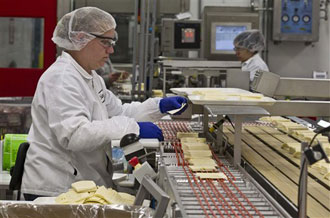Food Industry Outpaces Rest of Economy
While the recession took a toll on manufacturing and other industries, one part of the economy has remained a bright spot over the past few years: food production.
Across the nation, food producers are seeing enough growth that many are expanding and investing in new equipment.
For cheesemakers, dairy farmers and vegetable growers, the slow economy has brought opportunities to expand while construction costs are low. Food makers have also benefited from having products that consumers still buy in hard times and from ongoing efforts to open up new markets overseas.
The result is growth — both in sales and in facilities. The expansions include cheese-making operations in Wisconsin and Idaho and a sweet potato canning plant in Arkansas. Hershey Co. is spending $200 million to expand and update a plant in its namesake town in Pennsylvania, and General Mills Inc. has been pouring millions into yogurt plants in Michigan and Tennessee.
“Even in tough economic times, people are still going to buy groceries,” said Barbara Gannon, a spokeswoman for Wisconsin-based Sargento Foods Inc.
While Chrysler, General Motors and other companies tied to the auto industry have closed factories in Wisconsin in recent years, Sargento is among the food makers expanding there. It’s adding a multi-million-dollar building to its headquarters in Plymouth.
Sargento is the fifth local cheese company to expand in the past five years, Plymouth Mayor Don Pohlman said. Their growth makes his job easier when it comes to attracting other companies, he said.
“Businesses want to be around other businesses that are growing and expanding,” Pohlman said. “The cheese industry here really helps me sell the city.”
Unemployment in surrounding Sheboygan County was 7 percent in September, slightly better than the state average of 7.8 percent.
Gannon said Sargento began considering expansion a few months ago to keep up with demand that has remained brisk even as the economy stalled. The company, which is best known for its cheddar, Swiss and provolone cheeses, had about $900 million in sales last year and projects about $950 million in sales this year, Gannon said.
Other cheese makers and distributors — from Vern’s Cheese Inc. in Chilton, Wis., to Jerome Cheese in Jerome, Idaho — also are expanding factories and office spaces, saying they expect their good times to last.
That’s because cheese is recession food, said John Umhoefer, the executive director of the Wisconsin Cheese Makers Association. People are eating more frozen pizzas, he said, or adding string cheese to the lunches they’re increasingly packing at home.
“Even we didn’t necessarily see this coming,” Umhoefer said, “where a recession is a net positive for cheese sales.”
Another reason companies are expanding now is that constructions costs have come down. Edith Knoespel, who owns Vern’s Cheese with her husband, said their business hasn’t fully recovered from a dip two years ago but it’s come back enough that now is a smart time to grow. They expanded their retail store so the space that once held 10 customers can now fit 60.
“It’s just a good time to invest in building costs right now,” Knoespel said.
If it’s a good time for construction, it’s also apparently a good time to invest in heavy equipment.
The Association of Equipment Manufacturers is a Milwaukee-based industry group whose members includes companies like John Deere tractor maker Deere & Co.
Sales of 100-horsepower tractors, which cost about $75,000 to $100,000 each, were up 27 percent last month over the same month last year, said Charlie O’Brien, AEM’s vice president of agricultural services. Combine sales also have been up.
“They’re purchasing the equipment because there’s pretty good optimism,” O’Brien said of farmers who raise commodities such as corn, soybeans, wheat and rice. “There continues to be good demands for their commodities.”
That’s partly because China is importing more U.S. food, he said, and poor harvests because of bad weather in countries like Russia have led to even greater demand.
Michigan, one of the nation’s top producers of fruits and vegetables such as tart cherries, blueberries, apples, dry beans and sugar beets, exports about $1.7 billion in crops each year. Officials said that’s provided some stability in the state with the nation’s second-worst unemployment rate of 13 percent.
Food producers are “investing a lot of dollars here for the long term,” said Don Koivisto, the director of Michigan’s Department of Agriculture. “That’s led to lot of interest from other national industries about moving here. Agriculture has been one of the real backbones as we’ve struggled with the manufacturing downturn.”
DINESH RAMDE, Associated Press MILWAUKEE

Samantha Hansen inspects slices of cheese at the Sargento Cheese Company Friday, Nov. 12, 2010, in Plymouth, Wis. While the sluggish economy has taken a toll on manufacturing and related industries, one sector has remained a bright spot over the last few years: food production. (AP Photo/Morry Gash)

